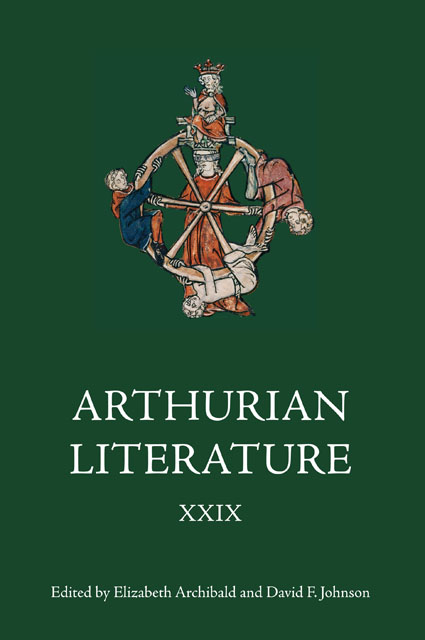Book contents
- Frontmatter
- Contents
- List of Illustrations
- General Editors’ Foreword
- List of Contributors
- I Edward III’s Abandoned Order of the Round Table
- II King Arthur’s Tomb at Glastonbury: The Relocation of 1368 in Context
- III Benedict of Gloucester’s Vita Sancti Dubricii: An Edition and Translation
- IV New Evidence for an Interest in Arthurian Literature in the Dutch Low Countries in the Fifteenth and Early Sixteenth Centuries
- V Malory’s Source-Manuscript for the First Tale of Le Morte Darthur
- VI Malory’s Sources – and Arthur’s Sisters – Revisited
- VII Peace, Justice and Retinue-Building in Malory’s ‘The Tale of Sir Gareth of Orkney’
- VIII Mapping Malory’s Morte: The (Physical) Place and (Narrative) Space of Cornwall
- IX The Fringes of Arthurian Fiction
- Contents of Previous Volumes
IV - New Evidence for an Interest in Arthurian Literature in the Dutch Low Countries in the Fifteenth and Early Sixteenth Centuries
Published online by Cambridge University Press: 14 February 2023
- Frontmatter
- Contents
- List of Illustrations
- General Editors’ Foreword
- List of Contributors
- I Edward III’s Abandoned Order of the Round Table
- II King Arthur’s Tomb at Glastonbury: The Relocation of 1368 in Context
- III Benedict of Gloucester’s Vita Sancti Dubricii: An Edition and Translation
- IV New Evidence for an Interest in Arthurian Literature in the Dutch Low Countries in the Fifteenth and Early Sixteenth Centuries
- V Malory’s Source-Manuscript for the First Tale of Le Morte Darthur
- VI Malory’s Sources – and Arthur’s Sisters – Revisited
- VII Peace, Justice and Retinue-Building in Malory’s ‘The Tale of Sir Gareth of Orkney’
- VIII Mapping Malory’s Morte: The (Physical) Place and (Narrative) Space of Cornwall
- IX The Fringes of Arthurian Fiction
- Contents of Previous Volumes
Summary
Introduction: The Reputed Absence of Late Medieval Dutch Arthurian Literature
The complex of Arthurian stories, from Latin historiography to French romance, was particularly popular in the Dutch Low Countries, and Middle Dutch authors produced a wealth of Arthurian texts – translations, adaptations and original works – in the later thirteenth and early fourteenth centuries, transmitted in a small number of manuscripts and numerous fragments from throughout the fourteenth century. It has been generally thought, however, that the production of new Middle Dutch Arthurian literature ceased altogether by the fifteenth century, as did most new manuscript production of older works. The only early known Arthurian printed text in Dutch is a Merlin of the second quarter of the sixteenth century, based on an English edition of the same text from 1510. This state of affairs forms a stark contrast with the situation in the surrounding English, French and German traditions, where Arthurian texts continued to be produced, and in the late fifteenth century particularly concerted efforts were made at synthesizing the Arthurian traditions in vast compendia.
While the disappearance of the Arthurian tradition from the Dutch Low Countries in the late Middle Ages is often remarked upon, a convincing explanation has not yet been proposed; scholars appear to attribute it to the volksgeist of the Dutch people: King Arthur, it has been claimed, was ‘too far removed from the roots’ of the people of the Low Countries in the late Middle Ages to be considered particularly relevant. It has also been noted with respect to the Dutch Charlemagne tradition that ‘it was especially the more fantastical and outlandish versions of the legend that appeared in print, whereas the more historiographically oriented texts fell out of favor’. It is argued that correspondingly the Arthurian tradition, with its historiographical aspirations, may have fallen victim to this same preference. The same authors do add a note of caution: ‘The state of its transmission may for all we know be misleading, but it would seem that Arthurian romance in the Low Countries was a decidedly medieval phenomenon’.
However, the apparent disappearance may be a mirage, partly caused by undue reliance on arguments based on the absence of evidence, and partly by a limited, and limiting, perspective on the late medieval Arthurian tradition.
- Type
- Chapter
- Information
- Arthurian Literature XXIX , pp. 101 - 110Publisher: Boydell & BrewerPrint publication year: 2012



